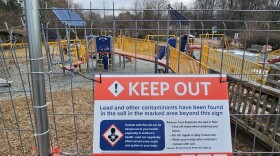The cost of building roads is skyrocketing, and it’s leading to big delays for highway expansions in North Carolina. That’s prompting the state Department of Transportation to consider tolling to pay for the projects — but that approach could face opposition in the state legislature.
The latest battle over tolling centers on U.S. 1, also known as Capital Boulevard, which often looks like a parking lot at rush hour. It’s the main connection from Raleigh to Wake Forest, and its series of stoplights can back up traffic for miles.
For decades, state transportation officials have been planning to convert the section from Interstate 540 to Wake Forest into a freeway. The project was originally slated to start in 2018, but it’s been repeatedly pushed back in the state’s planning matrix and now might have to wait until the 2030s.
The delays stem from cost increases across the country, according to NCDOT district engineer Becca Gallas. The National Highway Construction Cost index has increased by 67% over the past three years alone.
"We saw projects across the state undergo significant delays as the cost to do business, as well as our cash model, ran into some significant challenges," she said, noting that as costs increased on other projects, future projects like Capital Boulevard got pushed back.
The cost of the 10-mile freeway is now estimated at more than $1 billion. That prompted a study of using toll revenue to speed up the timeline. A regional transportation board made up of local elected officials approved the idea in May, although a few from the towns most affected by the plan voted no.
But the tolling idea quickly hit a roadblock in the legislature.
Rep. Mike Schietzelt, R-Wake, represents the Wake Forest area, and he added a provision to block Capital Boulevard tolls into the state House’s budget bill.
"We do not tax free roads in North Carolina, this road has been available for free use by the public for 110 years, and its history stretches back a lot longer than that," Schietzelt said during the budget debate. "I find it an affront to basic decency that we're willing to put the burden of expanding this road on working-class families and middle-class families."
Rep. Matthew Winslow, R-Franklin, said tolls on his county’s main connection to Raleigh will stifle its economic growth.
"What's not being considered is no new business industry will ever want to locate on U.S. 1 in Franklin County or in the northern counties, or in Wake County," he said.
Schietzelt’s proposed ban on Capital Boulevard tolls hasn’t become law yet, because lawmakers haven’t reached a budget agreement. But the tolling plan can’t move ahead without the legislature’s blessing because state law requires it for tolls on existing roads.
So far, North Carolina’s only toll roads are on newly built highways or lanes — like the Triangle Expressway in southern Wake County or the express lanes on Interstate 77 near Charlotte.
Senate leader Phil Berger says tolling proposals have to be considered given the state’s shortage of transportation funding.
"At some point, we've got to decide that we're either going to find a way to put dollars into those projects, or we're just going to relegate the folks that have to commute to the reality that they're going to be sitting in their cars a long time," he said.
Tolling could find some bipartisan support. Most Democrats in the House voted against Schietzelt’s toll ban amendment, saying they wanted to leave the decision to local leaders, and Sen. Natalie Murdock, D-Durham, says tolling has to be part of the discussion going forward. She notes that gas tax revenue is decreasing because more people are driving electric or hybrid cars.
"We're a state of over 11 million people, and say we're the Good Road State, and we can't continue to be the Good Road State if we don't raise revenue," she said. "So in my opinion, tolling is a part of that."
In addition to Capital Boulevard in Wake County, a transportation planning board in the Wilmington area voted in May to consider tolling the Cape Fear Memorial Bridge to pay for its billion-dollar replacement.
Replacing the aging bridge is one of the projects that didn’t secure funding in DOT’s 10-year construction plan, which is scheduled for a Board of Transportation vote this month. Known as the State Transportation Improvement Program, or STIP, the document prioritizes and schedules major projects through 2035.
The plan offers no relief over the next decade for several of the Triangle’s other biggest rush hour bottlenecks. Upgrades to U.S. 70 between Durham and Interstate 540 are listed in the plan without any scheduled funding. And a widening of a traffic-prone stretch of U.S. 64 near Zebulon isn’t even mentioned.
Gallas, the DOT engineer, said delays can lead to further increases in road construction costs. "One of the foundational challenges is just the cost of doing business in the transportation space continues to increase throughout the life of a project," she said.
While politicians continue to debate tolls, commuters in North Carolina’s fastest-growing areas are likely to see traffic get even worse.
Schedule for major Triangle road upgrades
Starting this year: Construction of the final tolled section of the Triangle Expressway between southern Wake County and Knightdale
2028: Widening N.C. 55 in Apex
2030: Upgrades to U.S. 70 in Brier Creek between T.W. Alexander Drive and Interstate 540
2030: Widening Interstate 885 from I-40 to N.C. 147 in southeastern Durham
2031: Converting Capital Boulevard (U.S. 1) to a freeway between I-540 and Wake Forest
2033: Interchange improvements on I-40 at N.C. 54 near Chapel Hill







